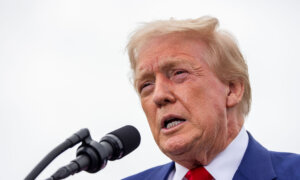Sen. Marco Rubio (R-Fla.) introduced a bill on July 31 aimed at deterring the Chinese regime’s state-sanctioned killing of Falun Gong practitioners for their organs.
The Falun Gong Protection Act would make it U.S. policy to avoid cooperation with China in the organ transplantation field and compel Beijing to end “any state-sponsored organ harvesting campaign.”
Under the measure, the U.S. president would need to provide to relevant congressional committees a list of foreign persons deemed to have “knowingly and directly engaged in or facilitated the involuntary harvesting of organs within the People’s Republic of China.”
Those on the list would face sanctions barring them from entering the United States or engaging in U.S.-based transactions. Any current visas they hold would be invalidated. The bill also prescribes a civil penalty of up to $250,000 and a criminal penalty of $1 million and 20 years in prison for perpetrators.
Within a year of the bill becoming law, the secretaries of State and Health and Human Services, along with the director of the National Institutes of Health, would be required to issue a report on organ transplant practices in China, including with respect to Falun Gong practitioners and other prisoners of conscience.
The officials would need to submit a list of U.S. grants that have supported organ transplantation in China over the past 10 years. The same officials would be required to determine whether the persecution of Falun Gong constitutes an “atrocity” under the Elie Wiesel Genocide and Atrocities Prevention Act of 2018.
Cosponsors of the Senate bill include Sens. Ron Johnson (R-Wis.), Roger Marshall (R-Kan.), and Thom Tillis (R-N.C.).
The House passed a companion version of the bill in June, which Rep. Scott Perry (R-Pa.) and 18 other lawmakers led.
If passed by the Senate and signed into law, the bill would become the first federal law to challenge China’s persecution and its illicit organ trade targeting the faith group.

Rep. Scott Perry (R-Pa.) speaks outside the U.S. Capitol on Feb. 28, 2022. (Drew Angerer/Getty Images)
In an earlier interview with The Epoch Times in mid-July, Marshall had expressed hope for the bill to get through the Senate.
“As a physician, I’m very aware of this medical tourism, where the biggest challenge right now in America is to get the organ that matches. So people are leaving the country in mass numbers. And we know where a lot of those organs are coming from [a] humanitarian crisis situation in China,” he told The Epoch Times. “So I hope we get the chance to do it.”

Sen. Roger Marshall (R-Kan.) at the Republican National Convention in Milwaukee, Wis., on July 18, 2024. (Screenshot via The Epoch Times)
The measure was introduced less than two weeks after the spiritual group marked 25 years of persecution in communist China. Featuring meditation and teachings centered on the principles of truthfulness, compassion, and tolerance, Falun Gong enjoyed wide popularity in China during the 1990s, with an estimated 70 million to 100 million people taking up the practice. But since July 1999, the group has faced an extensive campaign designed by the Chinese Communist Party (CCP) to eliminate them, one involving imprisonment, torture, forced labor, and forced organ harvesting.
Rubio unveiled the bill as a package to counter communist China’s influence. Two other legislative proposals include the Stop CCP Act to sanction CCP officials and their adult family members for “acts of aggression, oppression, and human rights abuses.”
The Stop CCP Act cites Beijing’s suppression of Hong Kong freedoms, its military harassment and aggression toward its neighbors including Taiwan, the Philippines, and India, as well as human rights abuses and forced labor in Tibet and Xinjiang.
The bill states that those who play a major role in condoning such behavior through policies from the top CCP decision-making bodies: the Politburo, the Central Military Commission, and the CCP’s Central Committee should be on a blacklist, banned from U.S. entry or having property or transactions based on the United States.
“Communist China has been able to get away with a campaign of widespread evil,” Rubio said in a statement. “From committing acts of genocide against religious and ethnic groups, to spearheading forced sterilization and abortions, as well as dominating crucial minerals and technologies, and impeding the sovereignty of several regional partners, the U.S. will not tolerate these practices.”
A number of states have been taking action to counter organ harvesting. Since June 2023, Texas, Utah, and Idaho have enacted laws to stop insurance companies from covering transplant surgeries if the organs originate from China.
The issue has also gained international attention, with a dozen U.N.-affiliated human rights experts saying that they are “extremely alarmed by reports of alleged ‘organ harvesting’ targeting minorities, including Falun Gong practitioners, Uyghurs, Tibetans, Muslims, and Christians, in detention in China.”

Falun Gong adherents march during a parade calling for the end of the Chinese Communist Party’s 25 years of ongoing persecution of Falun Gong practitioners in China at the National Mall in Washington on July 11, 2024. (Larry Dye/The Epoch Times)
The European Parliament in 2022 also adopted a resolution over “serious concern about reports of persistent, systematic, inhumane and state-sanctioned organ harvesting from prisoners in China, and more specifically from Falun Gong practitioners.” It stated that the CCP’s practice of forced organ harvesting “may amount to crimes against humanity.”
The State Department in multiple recent reports highlighted forced organ harvesting.
Two days after the House passage of the Falun Gong Protection Act, a State Department spokesperson called on the CCP to allow for “independent and transparent investigations into the country’s organ transplantation system” and “welcome independent observers to investigate the veracity of these reports.”
The regime should “cease its depraved actions against prisoners of conscience and act in accordance with its human rights commitments and fully comply with all relevant medical and ethical standards and best practices, including acting in the best interests of the patient, informed consent, and respect for personhood,” the spokesperson told NTD, a sister outlet of The Epoch Times.














